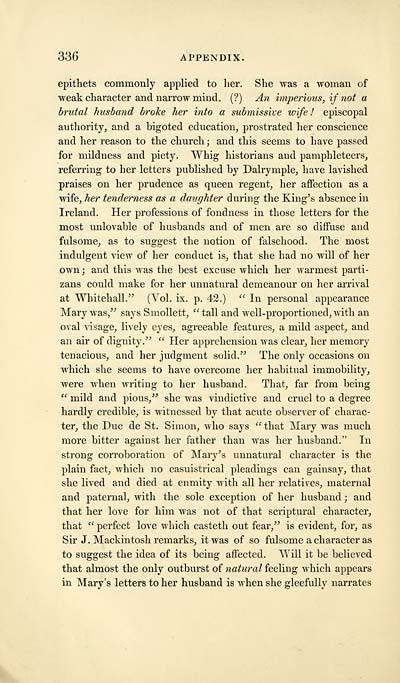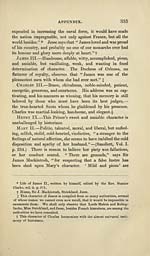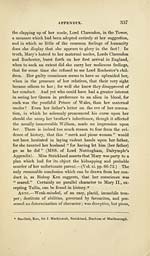Descendants of the Stuarts
(392) Page 336
Download files
Complete book:
Individual page:
Thumbnail gallery: Grid view | List view

336 APPENDIX.
epithets commonly applied to her. She was a woman of
weak character and narrow mind. (?) An imperious, if not a
brutal husband broke her into a submissive wife ! episcopal
authority, and a bigoted education, prostrated her conscience
and her reason to the church ; and this seems to have passed
for mildness and piety. Whig historians and pamphleteers,
referring to her letters published by Dalrymple, have lavished
praises on her prudence as queen regent, her affection as a
wife, her tenderness as a daughter during the King's absence in
Ireland. Her professions of fondness in those letters for the
most unlovable of husbands and of men ai-e so diffuse and
fulsome, as to suggest the notion of falsehood. The most
indulgent view of her conduct is, that she had no will of her
own ; and this was the best excuse which her warmest parti-
zans could make for her unnatural demeanour on her arrival
at Whitehall." (Vol. ix. p. 42.) " In personal appearance
Mary was," says Smollett, "tall and well-proportioned, with an
oval visage, lively eyes, agreeable features, a mild aspect, and
an air of dignity." " Her apprehension was clear, her memory
tenacious, and her judgment solid." The only occasions on
which she seems to have overcome her habitual immobility,
were when Avriting to her husband. That, far from being
" mild and pious," she was vindictive and cruel to a degree
hardly credible, is witnessed by that acute observer of charac-
ter, the Due de St. Simon, who says " that Mary was much
more bitter against her father than was her husband." In
strong corroboration of Mary^s unnatural character is the
plain fact, which no casuistrical pleadings can gainsay, that
she lived and died at enmity with all her relatives, maternal
and paternal, with the sole exception of her husband ; and
that her love for him was not of that scriptural character,
that " perfect love which casteth out fear," is evident, for, as
Sir J. Mackintosh remarks, it was of so fulsome a character as
to suggest the idea of its being affected. Will it be believed
that almost the only outburst of natural feeling which appears
in Mary's letters to her husband is when she gleefully narrates
epithets commonly applied to her. She was a woman of
weak character and narrow mind. (?) An imperious, if not a
brutal husband broke her into a submissive wife ! episcopal
authority, and a bigoted education, prostrated her conscience
and her reason to the church ; and this seems to have passed
for mildness and piety. Whig historians and pamphleteers,
referring to her letters published by Dalrymple, have lavished
praises on her prudence as queen regent, her affection as a
wife, her tenderness as a daughter during the King's absence in
Ireland. Her professions of fondness in those letters for the
most unlovable of husbands and of men ai-e so diffuse and
fulsome, as to suggest the notion of falsehood. The most
indulgent view of her conduct is, that she had no will of her
own ; and this was the best excuse which her warmest parti-
zans could make for her unnatural demeanour on her arrival
at Whitehall." (Vol. ix. p. 42.) " In personal appearance
Mary was," says Smollett, "tall and well-proportioned, with an
oval visage, lively eyes, agreeable features, a mild aspect, and
an air of dignity." " Her apprehension was clear, her memory
tenacious, and her judgment solid." The only occasions on
which she seems to have overcome her habitual immobility,
were when Avriting to her husband. That, far from being
" mild and pious," she was vindictive and cruel to a degree
hardly credible, is witnessed by that acute observer of charac-
ter, the Due de St. Simon, who says " that Mary was much
more bitter against her father than was her husband." In
strong corroboration of Mary^s unnatural character is the
plain fact, which no casuistrical pleadings can gainsay, that
she lived and died at enmity with all her relatives, maternal
and paternal, with the sole exception of her husband ; and
that her love for him was not of that scriptural character,
that " perfect love which casteth out fear," is evident, for, as
Sir J. Mackintosh remarks, it was of so fulsome a character as
to suggest the idea of its being affected. Will it be believed
that almost the only outburst of natural feeling which appears
in Mary's letters to her husband is when she gleefully narrates
Set display mode to:
![]() Universal Viewer |
Universal Viewer | ![]() Mirador |
Large image | Transcription
Mirador |
Large image | Transcription
Images and transcriptions on this page, including medium image downloads, may be used under the Creative Commons Attribution 4.0 International Licence unless otherwise stated. ![]()
| Histories of Scottish families > Descendants of the Stuarts > (392) Page 336 |
|---|
| Permanent URL | https://digital.nls.uk/94932682 |
|---|
| Description | A selection of almost 400 printed items relating to the history of Scottish families, mostly dating from the 19th and early 20th centuries. Includes memoirs, genealogies and clan histories, with a few produced by emigrant families. The earliest family history goes back to AD 916. |
|---|

